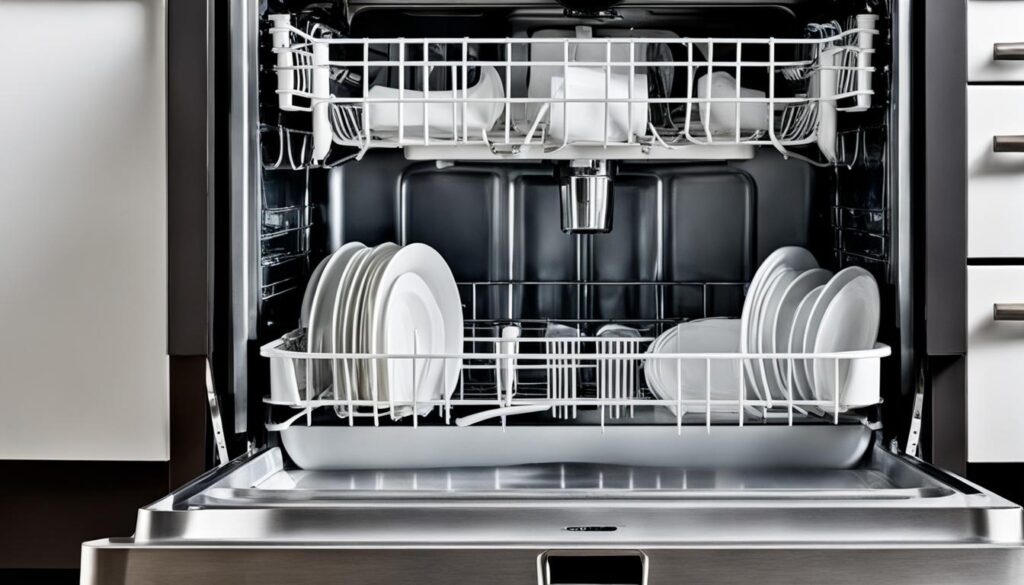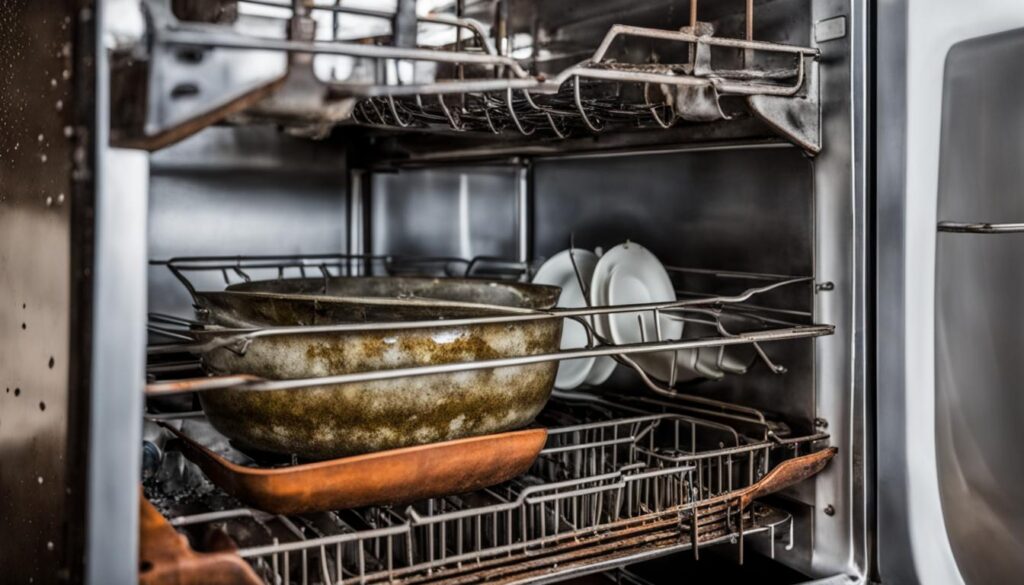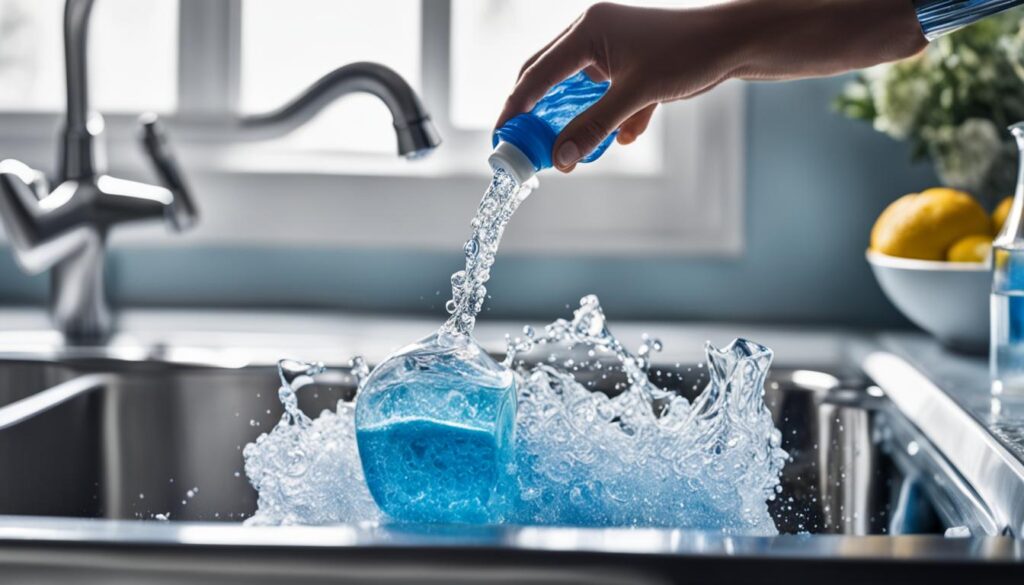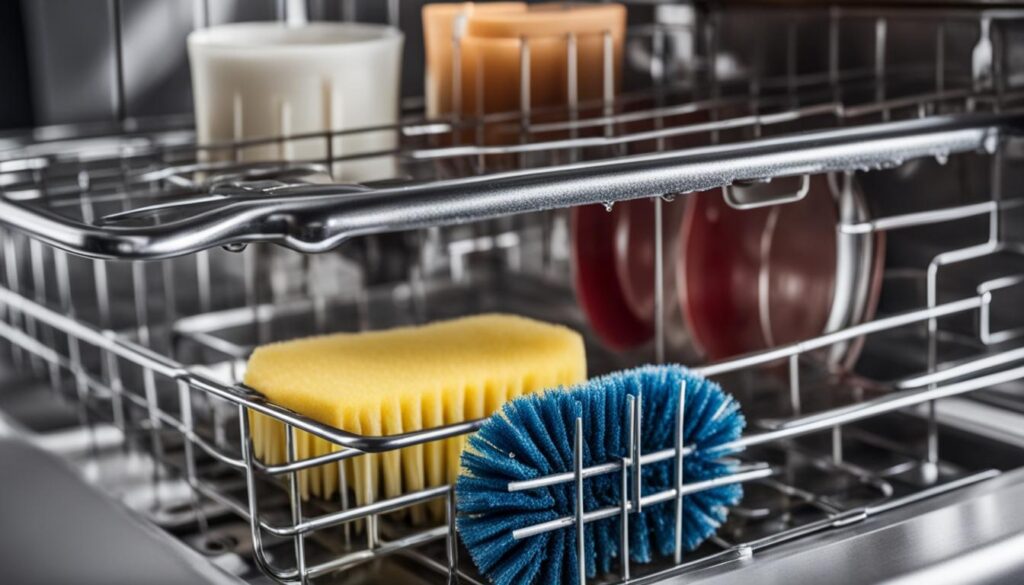
Welcome to our article on the impact of hard water on dishwashers and how to prevent damage. Hard water can cause numerous issues with your dishwasher, ranging from mineral buildup to decreased efficiency and even damage to internal components. By understanding the impact of hard water and implementing preventive measures, you can extend the longevity of your dishwasher and ensure it continues to operate at peak performance.
Keep reading for more information on the effects of hard water on dishwashers and practical tips to prevent damage.
Before diving into the effects of hard water on dishwashers, let’s first understand what hard water is. Hard water is water that contains high levels of minerals such as calcium and magnesium. These minerals can accumulate in your dishwasher’s internal components, pipes, and on your dishes.
These mineral deposits can lead to a variety of negative effects on your dishwasher’s performance and lifespan. The effects of hard water on dishwashers include:
To summarize, hard water can significantly impact the performance and lifespan of your dishwasher, leading to decreased efficiency, clogs, and potentially costly damage.

Hard water can cause various issues in your dishwasher that can affect its efficiency and damage its components. Here are some common signs that indicate your dishwasher is being affected by hard water:

If you notice any of these signs, it’s essential to take action to prevent further damage to your dishwasher. Ignoring these signs can lead to more significant issues, requiring costly repairs or even a replacement.
Preventing hard water damage to your dishwasher is crucial in prolonging its lifespan and ensuring its efficient performance. Here are some of our top tips:
Installing a water softener system can significantly reduce the mineral content in your water, preventing mineral buildup in your dishwasher’s internal components and pipes. This can also result in cleaner dishes with less spotting or film.
Adding a cup of white vinegar to your dishwasher’s rinse cycle can help break down mineral buildup and prevent damage to your dishwasher’s heating element. This simple trick is a cost-effective and easy way to prevent hard water damage.
Regularly cleaning and maintaining your dishwasher can help prevent hard water damage. This includes wiping down the interior with a damp cloth, checking and cleaning the filters, and ensuring proper drainage. Regular maintenance can also catch any potential issues before they turn into larger problems.
Using dishwasher-safe detergent can also help prevent hard water damage. These detergents are formulated to work effectively with hard water, preventing buildup on dishes and in your dishwasher.
Rinse aids work by breaking down mineral buildup and preventing spots and film on dishes. Using a rinse aid in conjunction with other preventive measures can further reduce the negative effects of hard water on your dishwasher.

Implementing these preventive measures can go a long way in preventing hard water damage to your dishwasher. By taking care of your appliance, you can ensure its longevity and efficient performance for many years to come.
Regular maintenance is essential in prolonging the life of your dishwasher and preventing hard water damage. By following a few simple maintenance tasks, you can ensure that your dishwasher continues to work efficiently for years to come.
One of the most important maintenance tasks for your dishwasher is regular cleaning. This includes clearing out any food debris from the dishwasher’s interior, cleaning the filters, and wiping down the dishwasher’s exterior. Regular cleaning will keep your dishwasher running smoothly and prevent any build-up of hard water deposits.
Check your dishwasher regularly for any signs of leaks. A leak can cause damage to the dishwasher’s internal components, leading to further problems down the line. If you notice any leaks or standing water in or around your dishwasher, it’s essential to get it repaired immediately to prevent damage and maintain efficiency.
Dishwasher filters are responsible for preventing food debris from entering the dishwasher’s plumbing system. Over time, filters can become clogged, affecting the dishwasher’s performance. It’s important to clean your dishwasher’s filters regularly and replace them as needed to prevent clogs and hard water damage.
Proper drainage is essential for the efficient performance of your dishwasher. Check the dishwasher’s drainage system regularly, including the pump and hoses, to ensure that everything is working correctly. Any clogs or blockages should be removed immediately to prevent damage to the dishwasher or plumbing system.

Regular maintenance is essential for maintaining the longevity of your dishwasher. By following these tips, you can keep your dishwasher running smoothly and prevent hard water damage. Don’t wait until your dishwasher is showing signs of damage before implementing a maintenance schedule. A little effort can go a long way in protecting your dishwasher and ensuring that it continues to serve you for years to come.
At Express Appliance Repair, we understand the frustration and inconvenience of a malfunctioning dishwasher. That’s why our team of professional technicians is dedicated to providing fast and efficient dishwasher repair services.
Our technicians have the expertise and experience to diagnose and repair various dishwasher issues, including those caused by hard water damage. We use state-of-the-art equipment and tools to ensure that your dishwasher is repaired to the highest standard.
Whether you need a simple repair or a complete overhaul of your dishwasher, we’re here to help. We offer same-day service and flexible appointment scheduling to accommodate your busy schedule.
Don’t let hard water damage ruin your dishwasher and disrupt your daily routine. Contact us today for reliable and professional dishwasher repair services.

As we wrap up this article, we want to emphasize the importance of preventing hard water damage to maintain the efficiency and longevity of your dishwasher. By understanding the impact of hard water and recognizing the signs of damage, you can take necessary steps to prevent further issues.
Regular maintenance, including cleaning and checking for leaks, inspecting and cleaning filters, and ensuring proper drainage, is essential in extending the lifespan of your dishwasher. Implementing preventive measures such as using a water softener system, adding vinegar to your dishwasher, using dishwasher-safe detergent, and utilizing rinse aids can help minimize the negative effects of hard water on your appliance.
If you do experience issues with your dishwasher, hiring professional dishwasher repair services like Express Appliance Repair can help. Our skilled technicians have the expertise to diagnose and repair various dishwasher issues caused by hard water damage. By entrusting your appliance to us, you can rest assured that it will be restored to its optimal functionality and efficiency.
Remember, prevention is key to maintaining your dishwasher’s longevity and efficient performance. By following the tips provided and seeking professional repair services when needed, you can protect your appliance from the harmful effects of hard water and ensure it continues to serve you well for years to come.
Hard water is water that contains high levels of minerals such as calcium and magnesium.
Hard water can leave behind deposits on your dishwasher’s internal components, pipes, and dishes, which can lead to decreased efficiency and damage to the heating element.
Common signs of hard water damage include spotted or cloudy glasses, residue or film on dishes, reduced water flow, and unusual noises during operation.
You can prevent hard water damage by using a water softener system or adding vinegar to your dishwasher, regular cleaning and maintenance, using dishwasher-safe detergent, and utilizing rinse aids.
Regular maintenance tasks such as cleaning, checking for leaks, inspecting and cleaning filters, and ensuring proper drainage help extend the lifespan of your dishwasher.
Hiring professional dishwasher repair services like Express Appliance Repair can ensure that skilled technicians diagnose and repair various dishwasher issues caused by hard water damage, restoring your appliance’s functionality and efficiency.
By following the tips provided in this article and seeking professional repair services when needed, you can protect your appliance from the harmful effects of hard water and maintain its efficiency and longevity.